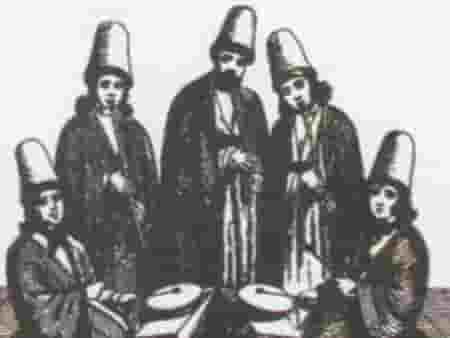10 Principles of Al-Insan Al-Kamil (The Perfect Man)
In this post, I will explain to you what al-insan al-kamil is and point out 10 principles to become the Perfect Human Being. In Sufism, enlightenment alone is not really beneficial unless it comes with responsibility.
There is nothing worst than an enlightened man who uses his power to achieve his endless, worldly and selfish desire. Thus, morality and power go hand-in-hand with each other.
1. What is Al-insan al-kamil?
In Islam, al-insan al-kamil is the highest spiritual achievement, representing The Perfect Man, the Complete Human Being, or the one who has reached perfection.
According to Sufism, human beings are predestinated to become al-insan al-kamil. In other words, the final destination, the end goal, and the meaning of life of all human beings on this planet are to become The Perfect Man.
Although we are the masters of our life in a sense that we have the free will to make choices we think are best for us, we all have the same destination, the same destiny, and the same fate as God speaks in the Quran:
“To Him belongs the dominion of the heavens and the earth: and to Him all things are returned.” (Quran 57:5)
If you are a Christian, you will become a complete Christian. If you are a Jew, you will become a complete Jew. If you are a Muslim, you will become a complete Muslim.
When we are under the influence of the demands, desires, and illusions of the nafs (the ego), our life becomes distorted, which then leads us astray from the path. Otherwise, to be a fully human being is to return back to the original source of our existence, to retain our divine nature, and to become The Perfect Human Being.
The Sufis teach that prophet Muhammad, Jesus or Buddha are the archetypes of al-insan al-kamil. That is, they are the exemplars, epitomes, or embodiments of the Perfect Man. They are not idols for worship but they are teachers, messengers, and prophets that we need to learn from to realize our divinity within our human nature.
Perfection comes from the complete transformation of the “self” based on 7 stages of the nafs. The goal of Sufism is to use every possible way that enables the transformation within a human being, making him whole, completed, and perfect who acts as a vicegerent of God on earth.
Behold, your Lord said to the angels: “I will create a vicegerent on earth.” (Quran 2:30)
This vicegerent/representation of God is literally the reflection of God’s quality upon the Earth. In Islamic traditions, God has 99 names, which are the 99 divine qualities mentioned in the Quran. Some of these are the everyday qualities of a normal human such as seeing, hearing, knowing, speaking, and willing. The Sufi recognizes that the more of these qualities are reflected in our human nature, the closer a person is to the path of completion, or the path to become The Perfect Human Being (al-insan al-kamil).
2. 10 Principles of Al-insan Al-kamil
It doesn’t matter what you do to supplement the insufficiency of human completion. If your starting point is less than human perfection, the result will only be a distorted version of human perfection.
In Sufi traditions, there are 10 principles of al-insan al-kamil that are used for the process of human transformation. I learn these principles from the book The Knowing Heart by Kabir Helminski – a Sufi teacher of Threshold Society.
- Dhikr
- Worship
- Submission
- Ethics
- Brotherhood
- Sohbet
- Reason and conscious reflection
- Holy books
- Fasting
- Movement and body works
1. Dhikr
Dhikr means remembrance of God in all circumstances. Remembrance draws the light of the Spirit into the heart. Therefore, it illumines the body and the soul as the whole and is capable of transforming the ego.
“Remember me, and I will remember you” (Quran 2:152)
Your heart is like a mirror. When you remember God, you polish your heart with the “water” (knowledge) of the spirit. This water dispels all of the darkness, sickness, and ‘dis’ease of the heart.
“For without doubt, in the remembrance of Allah do hearts find satisfaction” (Quran 13:28)
By remembering God, the heart finds its tranquility, harmony, and satisfaction because it is now being aware of the source of its existence.
In Sufism, when you utter sacred phrases of Dhikr, your lataif (energy centers/chakras) starts to vibrate on a higher level which helps to clear off Samsara (spiritual dust) in your subtle body.
When you practice Dhikr, you become more aware of your actions and consequences of your actions. You will naturally find a way to be closer to God. Your heart will live in a state of presence, fullness, and wholeness because these are the qualities of al-insan al-kamil.
2. Worship
In Sufism, the principle of worship means the integration of all one’s faculties and senses in expressing love and respect to God. As human beings, we all worship something, whether it is money, power, or idols. The Sufi teaches that it totally depends on what you worship that determines what you will receive something of equivalence.
For example, if you worship money, what you receive are the vain desires that cause you to worry much about the future, to come up with strategies to make more money, to work harder and harder. Therefore, it separates you and the presence, making you in a state of restlessness, instant conflicts, and continual thinking.
However, if you worship God, what you receive is the state of being in the presence of God, the state of living fully, wholly, and totally as a human being. You will be enchanted in a state of being loved, guided, and taken care of.
3. Submission
In Islam, submission means to act according to God’s will and regard God as the center of your reality.
“Wherever you turn, there is the Face of God.” (Quran 2:115)
As God is the All-encompassing, Most Compassionate, and Most Merciful, one’s actions must be beneficial for the whole of humankind, selfless, and contains unconditional love.
Submission proceeds from the Unseen to the Seen, from the unmanifest to the manifest, and from the finite to the infinite. It is the state in which the nafs (the ego) totally surrenders to the ruh (the spirit) to perform righteous deeds.
According to Sufi teachings, the highest achievement of al-insan al-kamil is the complete submission to the will of God because God and human beings are essentially One. This explains why “Islam” means “submission to God’s will” or “surrender to God”, representing the path to the divinity of every Muslim.
4. Ethics
Ethics means following the basic laws (sharia) and moral principles revealed in the Quran and other divine revelations.
Everything needs a base to start. It’s like when you first build a house you need to first build a strong foundation. Thus, the Quran is the most authentic and sacred foundational book in Islam because it is the book that is always in harmony with science, human being, and spiritual laws governing the universe.
Al-insan al-kamil is not the one who is restricted by human law, but by universal law that manifests in the unseen world. It is an inherent tendency in our human nature to establish law on earth. That’s why you see that we have “laws” for home, school, country, and so on.
The difference between human laws and divine laws is concentrated in one word: “Truth”. The universal law is that which does not change whether you believe in it or not. Humans can never break divine laws but the laws can definitely break human beings if they are not willing to obey.
Muslims regard the Quran as the guidance coming from the Absolute Being that teaches man what we should and should not do. For example, the law of Karma (Cause and Effect) is repeated so many times in the Quran because it is the truth that you will reap what you sow.
By following the ethics in the Quran, you will become more completed and lives in harmony with others, the universe, and the divine laws. Ethics is also the foundational structure for anyone who wishes to start the path of Sufism.
5. Brotherhood
Brotherhood is understood as the Sufi code centered on love, community, relationship, and interdependence.
It is the alliance of seekers of truth, the spiritual bond among all seekers who have undertaken a life’s journey together. If one of the seekers receives a blessing from God (baraka), he can transmit this divine power to others as well.
When a tree stands by itself, it is called a tree. When a bunch of trees stands by each other, we call them a forest, which is an interconnected system of trees. They are high in energy, strong in support, and extremely powerful.
The Sufis perceive the world as a collective rather than an individual system. Although a man who washes cars and a man who sells bread to people may look unrelated to each other, they are all under the same society. Thus, their actions will either benefit or harm the society’s well beings.
We can also bring this up to the national level because every nation is made up of many societies, and many societies are made up of many individuals.
6. Sohbet
In Sufism, Sohbet is Al-insan Al-kamil’s principle of spiritual conversation.
It is not a lecture or sermon, but a place where minds join together. It is storytelling where spiritual ideas, philosophy, and wisdom are exchanged. Sohbet is a place of sharing experiences, moral advice, and quotations from sacred books with the aim of helping others to advance in the process of completion.
During the conversation, questions and answers are exchanged, which eventually strengthen the quality of spiritual realization.
What is the point of achieving enlightenment alone and does not help other human beings? As the al-insan al-kamil acknowledges that we are related to each other in some ways, he will also strive his best to lead people to where they should be.
7. Reasoning and conscious reflection
The nafs have endless desires that can conceal the true feelings of the heart, and reason is the knife that cuts through this illusion to see the true nature of one’s heart.
Reason is the ability to evaluate, discern and reflect among ideas based on the degree to which they reflect the qualities of God.
Reason is the powerful tool of the conscious intellect to dissolve, revolve and evolve the condition of the mind, including both the subconscious and unconscious. Through reason that one can discern between what is right and wrong, when and how to speak, and what one should do and should not do.
According to Al-Ghazali, we can gain the knowledge of God by contemplating His signs. Through contemplation, we come to realize that it is the power of God that causes the Sun and the Moon to travel in a prescribed order. It is He who alters the Night and the Day. God’s power is really incomprehensible to the human mind as we can’t even explain why the seed from the ground can successfully grow up to be a tree.
8. Holy books
By reading the Word of God (i.e the Quran, Bible, etc.), our body, mind, and spirit get baptized and revitalized into a higher state of awareness. The Word of God contains so much power that it can purify the heart, transform the ego, strengthen the body, activate the mind, and awaken the spirit.
In Sufism, the Quran is the most effective book to measure your spiritual progress although they sometimes use the Bible.
Every sacred scripture contains within itself a code (esoteric meanings). That is, the more you understand the hidden meanings behind the scriptures, the more advanced you are to become an al-insan al-kamil.
9. Fasting
Fasting is the process of purifying the body by emptying one’s stomach for long period of time.
Nowadays, science has proved that fasting is an effective way for the body to detoxicate, revitalize, and reorganize itself into a healthy state of being. Just as the heart, mind, and soul need to be purified, the body also needs to be cleansed in order to prepare itself for the new healthy state of living.
10. Movement and body works
The last principle of Al-insan Al-kamil is the principle of movement and body works. As the body moves, the mind also vibrates. A good body usually goes together with a good mind and vice versa. Therefore, by keeping the body healthy through exercises such as yoga and fitness, this activity helps to maintain health and harmony between the body and the mind.
Prayer is the utmost body movement that can keep one strong and healthy, which is the reason why Muslims perform their ritual prayer 5 times per day.
Some Sufi exercises such as chanting, whirling and meditation are also useful for transcending the nafs through ecstasy of expansion.
These techniques are very powerful to open one’s lataif (subtleties, chakras) that activates the true power of the heart. When you open up lataif, you start your journey to the realm of essence, which is the world of the Unseen.
3. Enlightenment vs Responsibility
The idea of human perfection is the utmost importance in Sufism. Unless we become al-insan al-kamil, we may become something less than what a human being is capable of doing. Without being enlightened, we may just experience half of our life instead of living our life fully, totally, and completely.
In Sufism, the seekers search for not only the ecstasy itself but also the responsibility coming with the ecstasy. There is nothing worst than a spiritual and enlightened being who uses his power to manipulate others, indulge in vain desires, and achieve selfish goals.
Therefore, the aim of Sufi methodology is not to enlighten anyone as quickly as possible because enlightenment is just about the awakening of inherent power that we have already possess. It’s just about activating and transforming the lataif or energy centers within a human body that can lift up the veil of the unseen.
The more important point here is about developing the divine qualities and characters together with the state of enlightenment. As prophet Muhammad said: “The best of people are those who are most beneficial to people”, so the best enlightened people are the ones who use his power for the benefits of other people.




2 Comments
Zella
Wonderful website you have here but I was curious
if you knew of any discussion boards that cover the same topics discussed here?
I’d really like to be a part of community where I can get advice from
other knowledgeable individuals that share the same interest.
If you have any suggestions, please let me know. Many thanks!
Hoang Anh Nguyen Ba
I’d suggest the best way is to find a Sufi center around where you live. If you want to study Sufism online, I would suggest you go to this website https://www.nurmuhammad.com/. There are a lot of free but valuable information there. I believe they may give advice too, but you have to double check this.